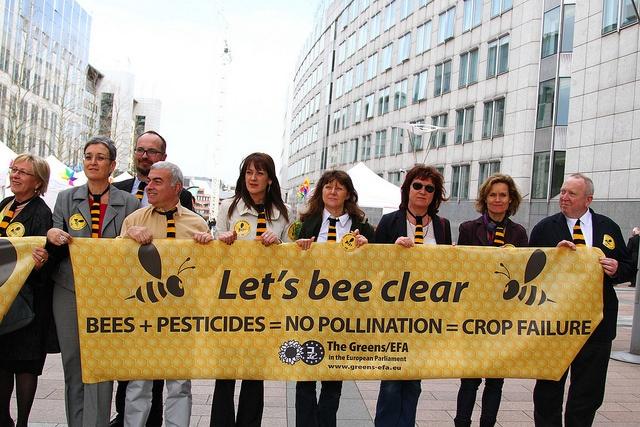
According to internal research documents obtained by Greenpeace under the Freedom of Information Act, both Bayer and Syngenta knew well about the negative impacts of neonicotinoid insecticides. Yet they still chose to sell the products widely, and even actively argued against independent studies connecting them to bee population declines.
The decline of bees has become a global issue, raising real concerns about the future of agriculture. For years, scientists struggled to figure out the cause – until they were able to connect it to a class of insecticides widely used around the world.
“Over recent years there has been a growing body of evidence that seed-coated neonicotinoids are harmful to beneficial insects, including bees. However, most of these studies are based on short-term experiments on honeybees,” said Dr. Nick Isaac from the Center for Ecology and Hydrology in Oxfordshire, in a press statement.
Enter environmental activists, who for years raised alarms about the growing power of big agricultural companies, and their impacts on the environment. We owe Greenpeace a big thanks for using the power of the legal system to access these two companies' internal research and sharing it with the public.
In fact, what the NGO found should reverberate throughout the entire agricultural industry. It shows, clearly, that these companies don't consider the planet's health enough when making business decisions.
"If Bayer and Syngenta cared about the future of our pollinators, they would have made the findings public," Greenpeace's Ben Stewart told the Guardian. "Instead, they kept quiet about them for months and carried on downplaying nearly every study that questioned the safety of their products. It's time for these companies to come clean about what they really know."
Had both companies been more open about their research, we could have connected bee declines to their products far earlier, and perhaps prevented the catastrophe from becoming so widespread. By grandstanding, these companies only made the problem worse, while continuing to profit at the expense of the environment.
If this sounds familiar, it's probably because it is. Earlier this year, Inside Climate News broke a major story that ExxonMobil, the world's largest publicly-traded oil company, knew about climate change years ago and not only hid that knowledge from the public, but also actively funded climate-denier research.
Exxon is now being investigated by the SEC and numerous state attorneys general for fraud. Syngenta and Bayer deserve the same treatment, given this evidence, and must be held responsible for the massive environmental damage their products have knowingly caused around the world.
This should also serve as a wake-up for greater transparency in the agriculture and biotech industries. Scientific research that has such wide-ranging impacts on our environment cannot be done behind closed doors at mega-corporations that are concerned about profit, not planet.
This information needs to be in the public domain, ideally under the purview of institutions such as universities so scientists everywhere can analyze impacts and ensure we don't release chemicals into the environment with such horrific, wide-ranging, negative impacts.
We know that #ExxonKnew. Now we also know that #BayerKnew and #SyngentaKnew.
Image credit: GreensEFA via Flickr

Nithin Coca is a freelance journalist who focuses on environmental, social, and economic issues around the world, with specific expertise in Southeast Asia.














